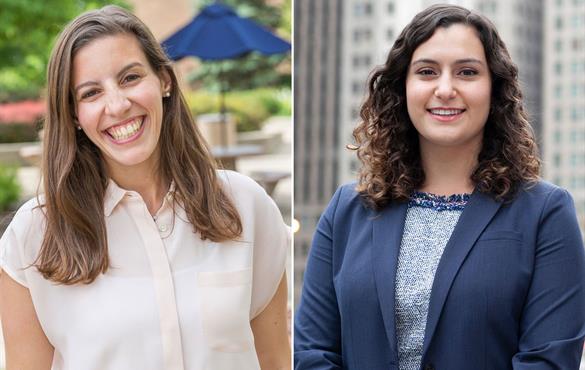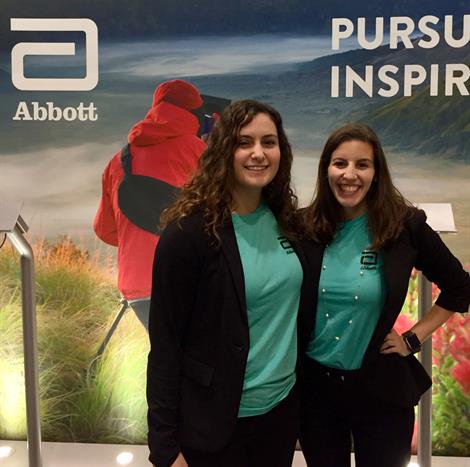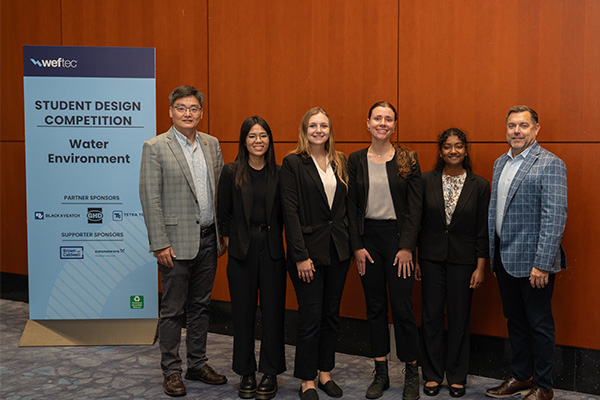Not into research? These alumnae have advice for you
Alumnae Jodi Small and Nicole Joison share how Abbott Laboratories’ Operations Professional Development Program gave them life-changing insight into industry

Alumnae Jodi Small and Nicole Joison have a great deal in common. Both earned bachelor's degrees in biomedical engineering from the McKelvey School of Engineering at Washington University in St. Louis. Both are members of the Chi Omega sorority. Both took part in the Abbott Laboratories' Operations Professional Development Program.
And now, as a result of that experience, they are both still with Abbott Laboratories. Small, who graduated from WashU in 2015, is a quality assurance specialist within Abbott's transfusion medicine division, and Joison, who graduated in 2016, is a manufacturing process engineer within Abbott's diabetes care division.
"I wouldn't be here if it weren't for Jodi," Joison said. "She told me about the summer experience that she had with Abbott and what a different perspective it gave her."
Small interned with Abbott following her junior year and says the experience made her aware of the different paths she could pursue with her degree.
According to the WashU Career Center, only a third of all biomedical engineering baccalaureate graduates reported entering the work force after graduating in 2018. Compare that to:
- 66% of electrical & systems engineering graduates
- 70.3% of mechanical engineering & materials science graduates
- 77% of computer science & engineering graduates
- 82% of energy, environmental & chemical engineering graduates
For students who aren't interested in continuing their education or pursuing research, it can be a challenge to figure out how to break into industry.
"I was one of those students," Small said. "I tried research, and it was not for me."
"There is definitely a group of engineers who see themselves not going into research or pursuing a medical degree," Joison said. "You're in this weird lump in the middle trying to figure out more about industry."
 Through the Abbott rotational experience, both women had the opportunity to work for one of the nation's biggest medical device manufacturers. During their experience, they were assigned to four different positions over two years at sites throughout the world. The program now involves three different positions over three years.
Through the Abbott rotational experience, both women had the opportunity to work for one of the nation's biggest medical device manufacturers. During their experience, they were assigned to four different positions over two years at sites throughout the world. The program now involves three different positions over three years.
"There were experiences that were required from the program — including a year in a technical role like manufacturing, engineering or supply chain — a year in a supervisory role managing a team, and a year in operational excellence working abroad," Joison said.
While the company provided training opportunities — including mentor programs and workshops — both Small and Joison credit their experiences at WashU for preparing them for the non-engineering aspects of their jobs.
"I owe a lot of my leadership abilities to things that I did at WashU," Joison said. "I was involved in Chi Omega. I served as a WUSA and as a member of the First Year Center Executive Board. I was speaking in front of people and having to lead teams."
"One thing that I did was the Regional Business Council Mentorship Program, which paired you up with an executive in the surrounding area," Small said. "It was a good way to gain exposure to businesses and industry outside of school."
While full-time placement with the company is not guaranteed after completing the program, the company does assist participants with their job search.
"Abbott does a good job of helping us get our resumes out to hiring managers within the company and giving us a good support system for networking and getting interviews," Joison said. "But the onus is definitely on us."
"I love Abbott and think there's a lot of room to grow and move around within a big company," Small said. "As you can see from all the jobs I've had within the program, there are many opportunities you can make for yourself."
Looking to get into industry?
Whether it’s part of a similar rotational experience program or full-time employment, Small and Joison have tips for students planning to enter the workforce.
Figure out what you do want to do
Students who know they don't want to do research should check out different job titles and careers to figure out what exactly does interest them."What does it really mean to be a manufacturing engineer, a process engineer or a reliability engineer?" Joison said. "There are so many different job titles for engineers, and that's something to try to understand as soon as possible because it helps when you're searching for roles."
Don't get too hung up over majors or degree
It can be easy to get tunnel vision and only search for jobs in a narrow range of disciplines, but keep an eye out for jobs in areas you may not have experience in.
"I think a lot of companies need people who can understand technical concepts and then apply them in different ways," Small said. "Within manufacturing settings, it's been helpful to know what the product is and how it works, because then you can work with the processes that surround the product."
Be flexible with location
You may have your heart set to work in a certain city or area, but be open-minded."Moving in a rotation program to unfamiliar places can be scary, but that's where you grow the most and learn what you are capable of,” Small said. “I don't think I fully understood how much I would grow from moving to places where I didn't know anyone and needed to adapt, make friends and survive on my own.”
Network
Take advantage of all your connections: classmates, student organizations, internships, whatever you’ve got.“I really do believe that the more you talk to people about what you're looking for, the more likely they'll be able to help you,” Joison said. “And be specific as possible. If a student can narrow that down, the more people can help them.”



